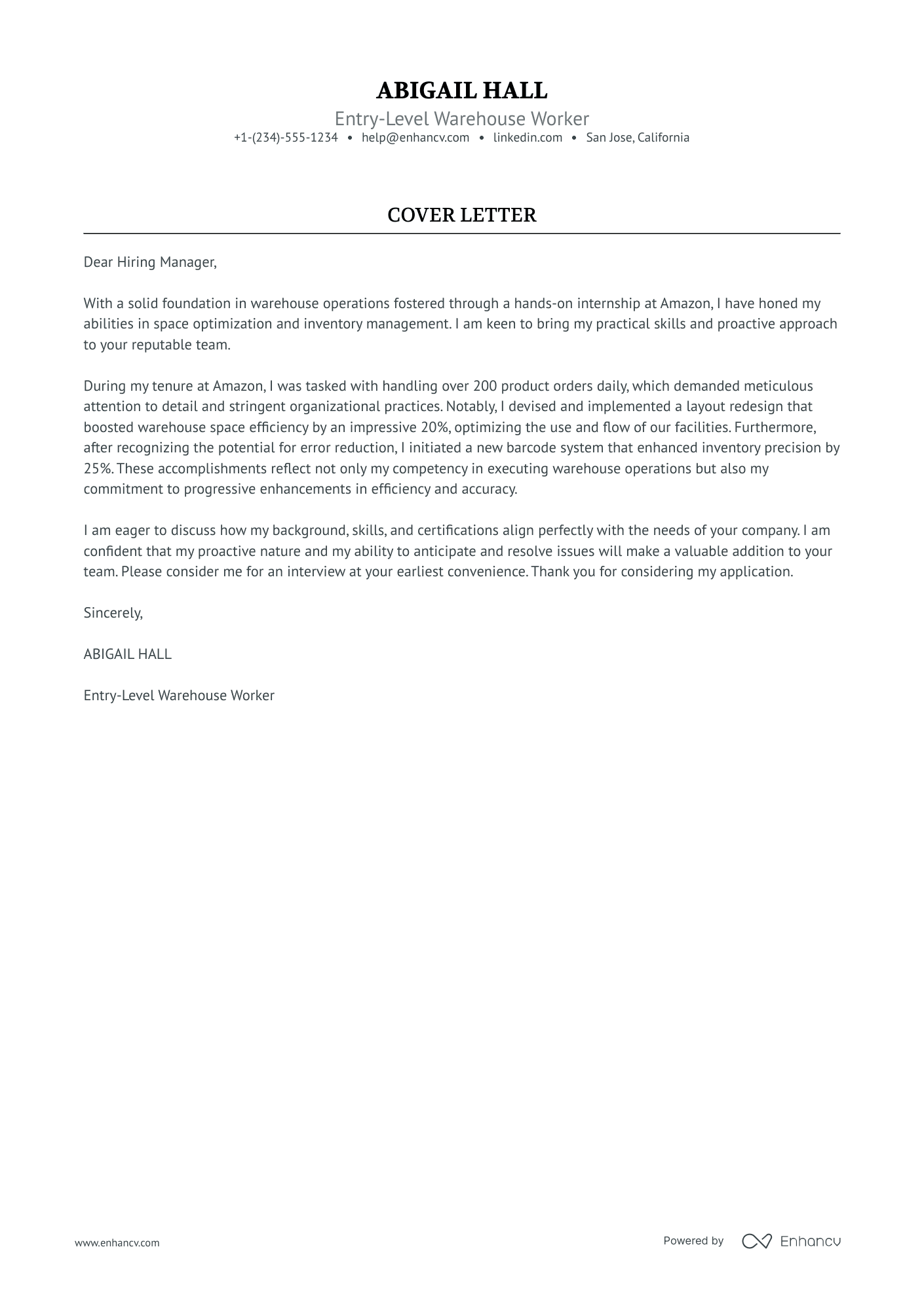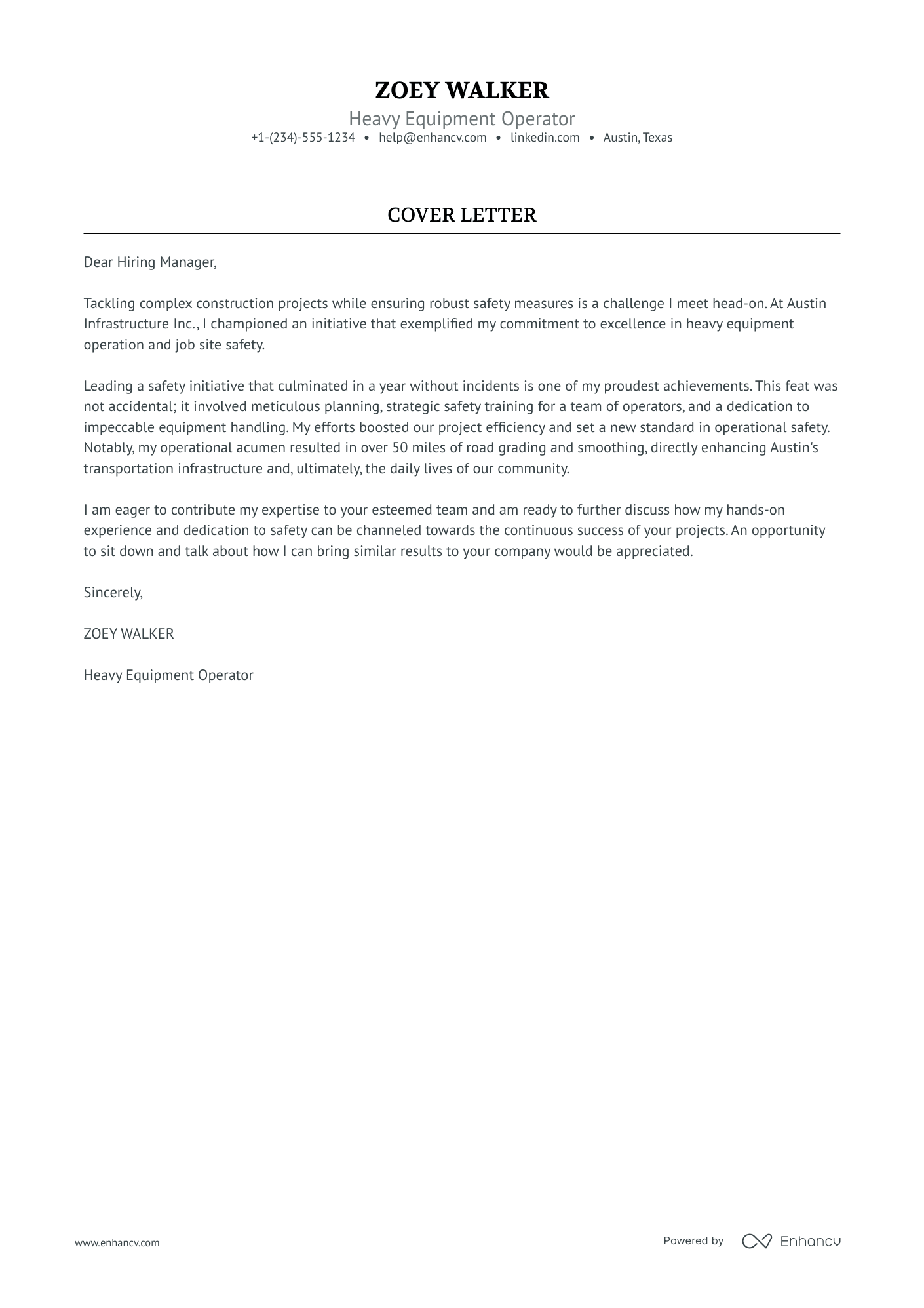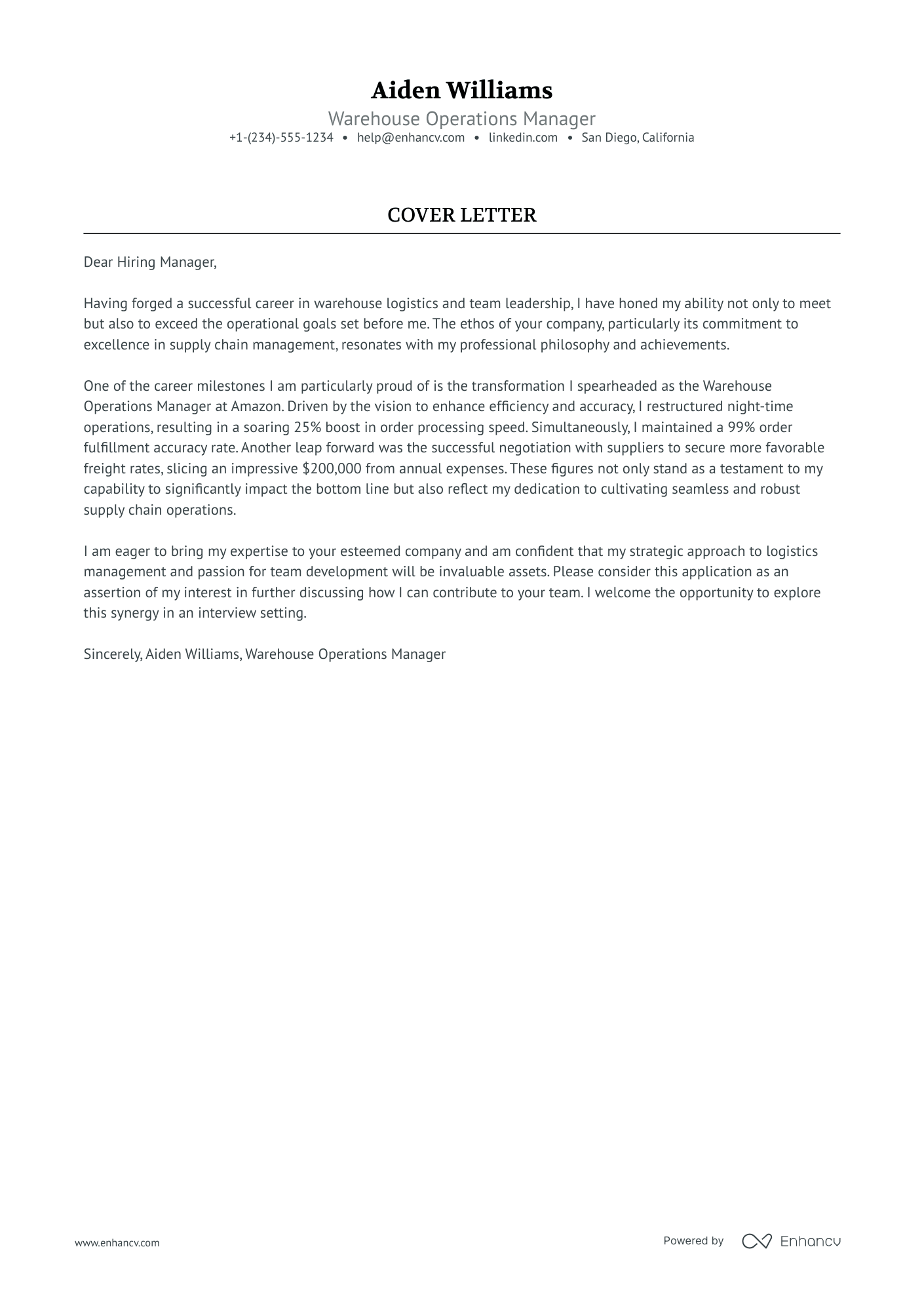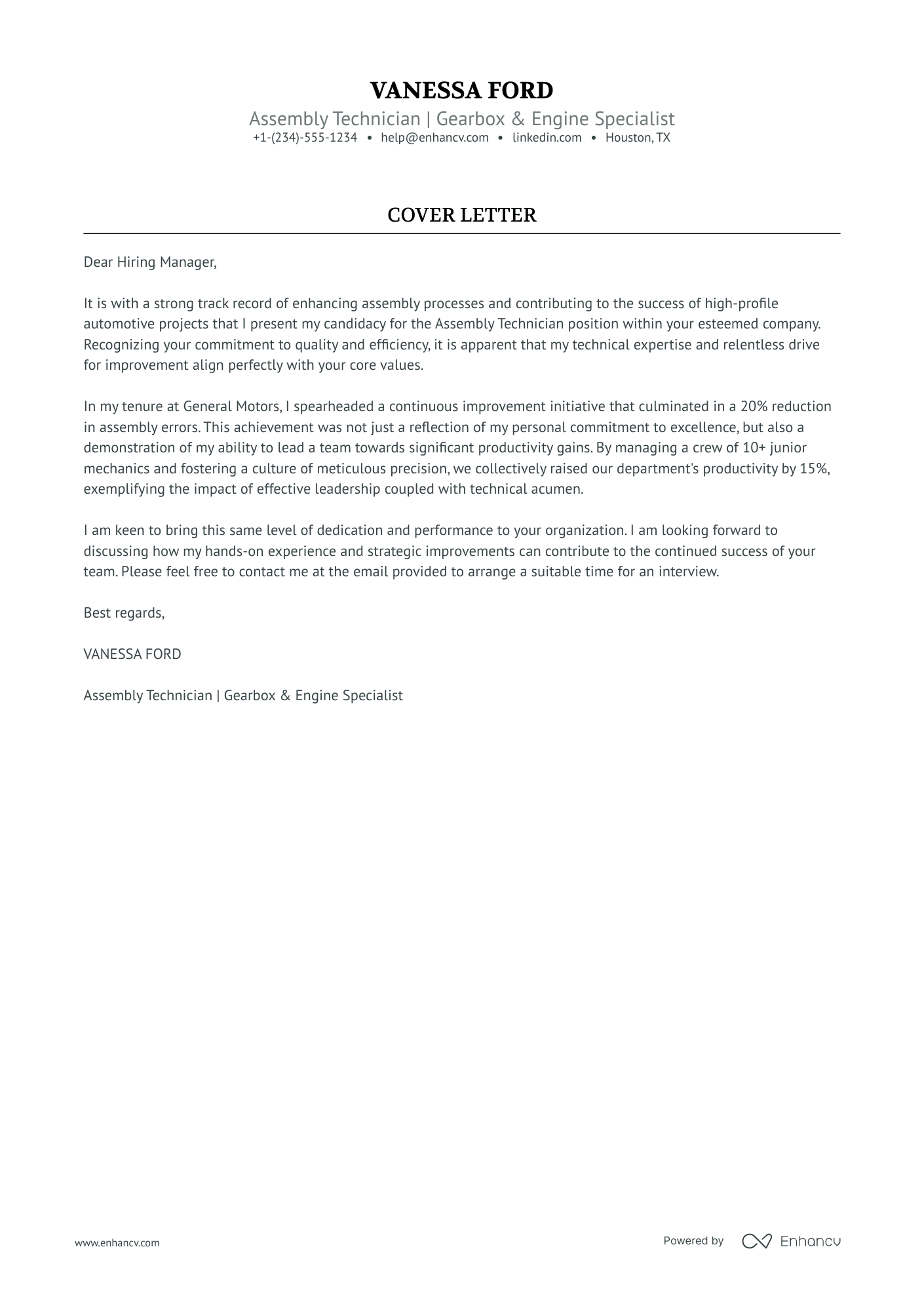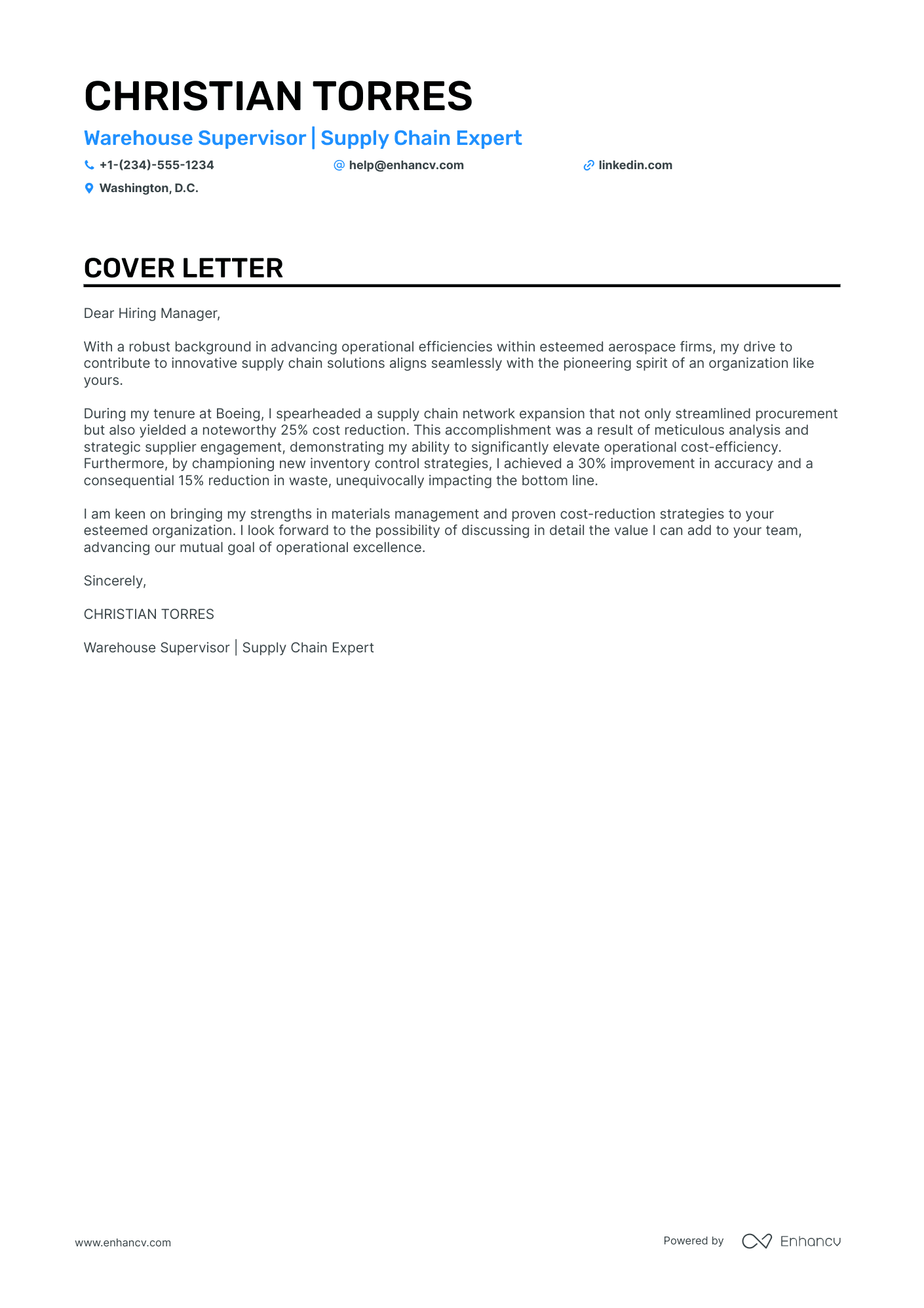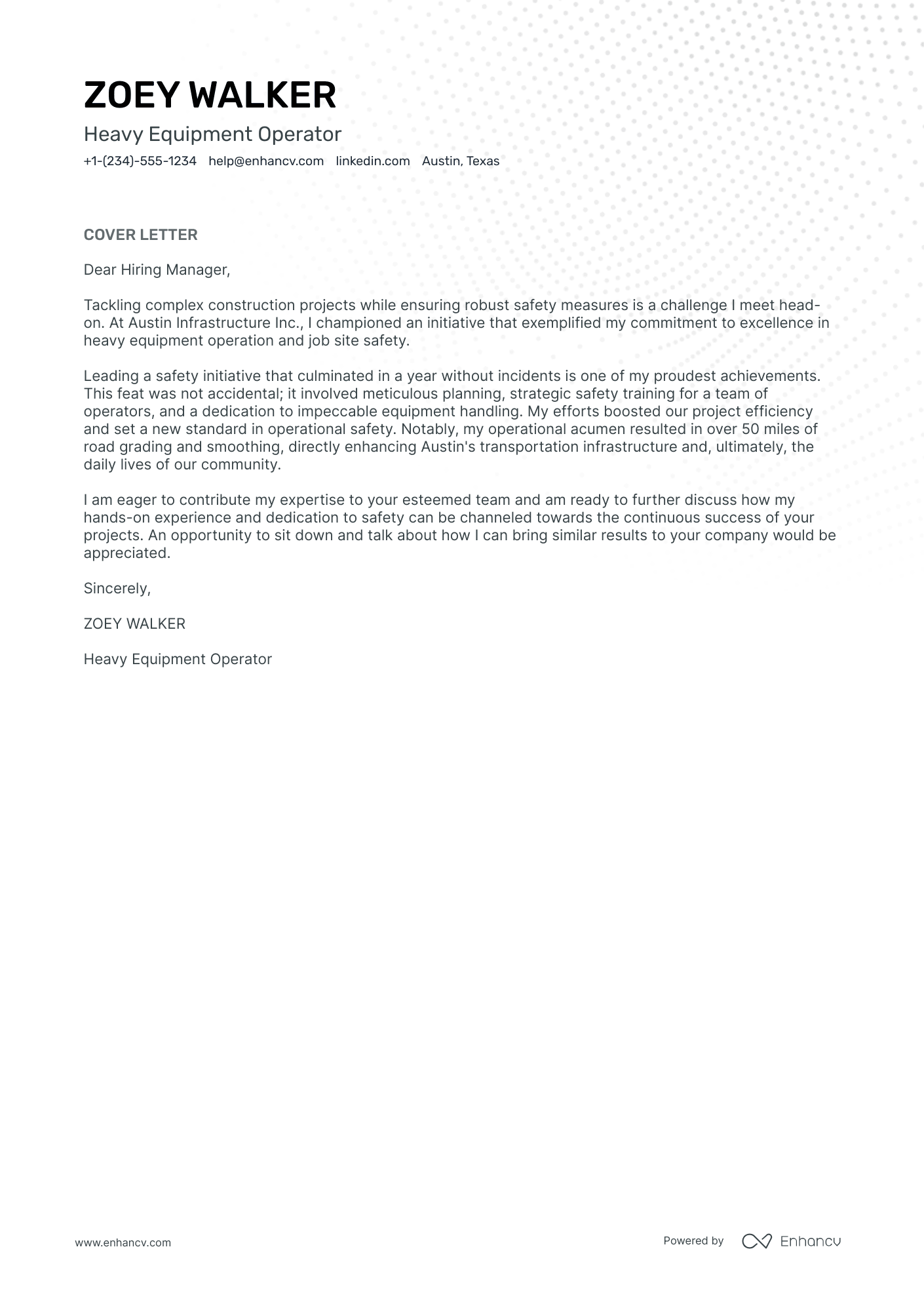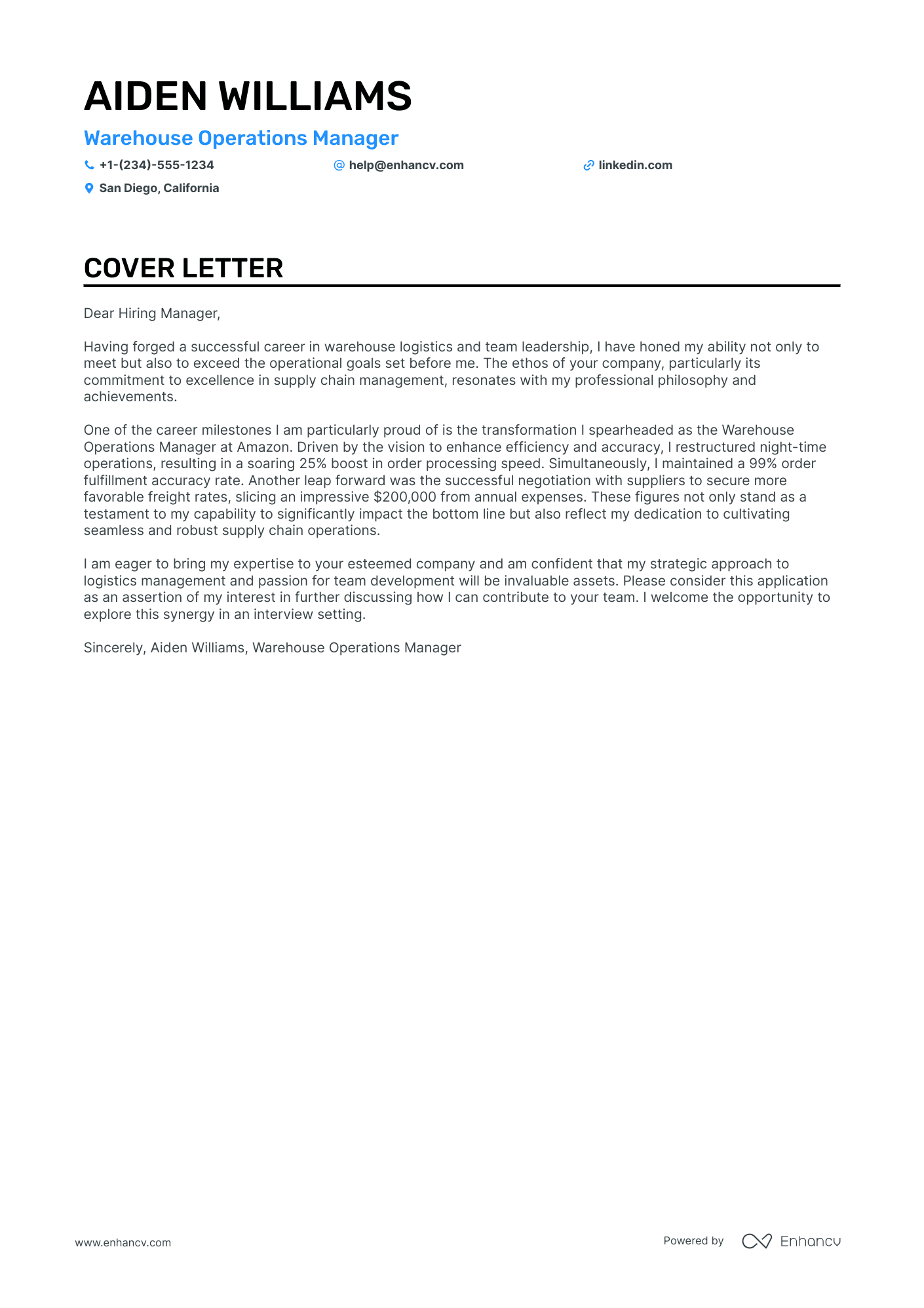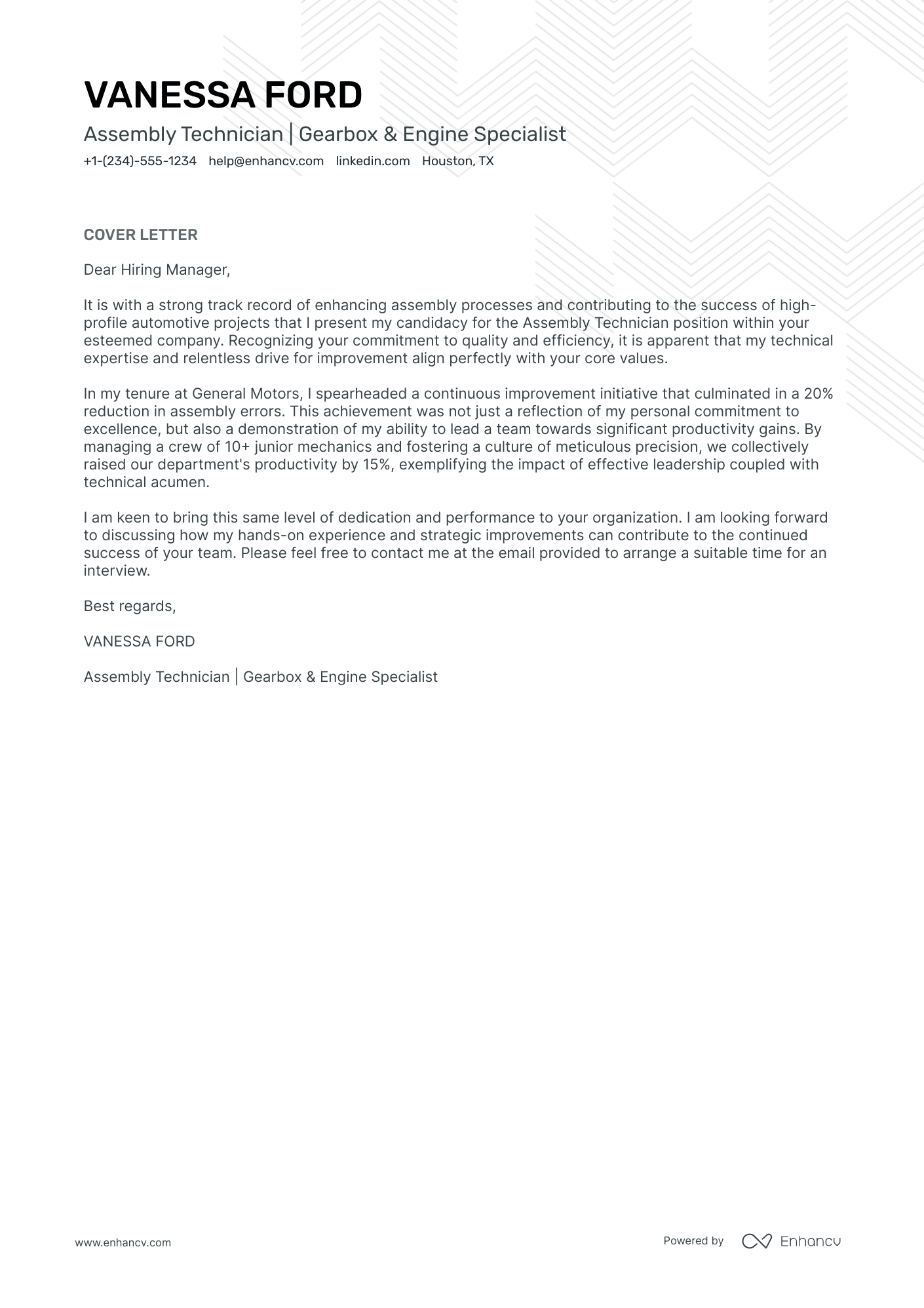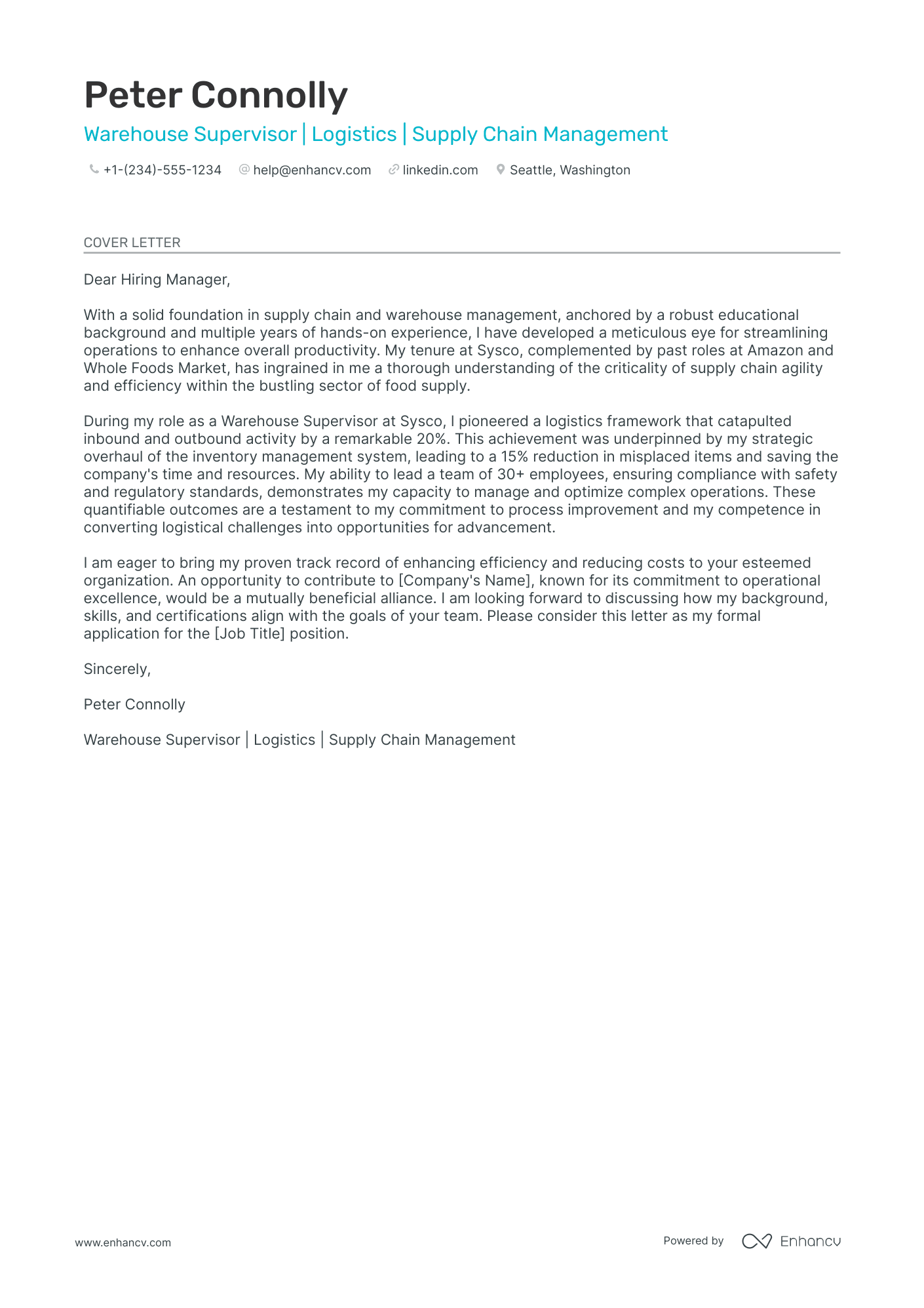Embarking on your job hunt, you've realized a standout warehouse worker cover letter can make or break your chances. This isn't just a repeat of your resume; it's your chance to share a compelling story about your proudest professional moment. But finding that sweet spot between formality and fresh, avoiding clichés and keeping it under one page—it's no small feat. Dive in to discover how you can craft a cover letter that captures your unique achievements and lands you the job.
- Personalize the greeting to address the recruiter and your introduction that fits the role;
- Follow good examples for individual roles and industries from job-winning cover letters;
- Decide on your most noteworthy achievement to stand out;
- Format, download, and submit your warehouse worker cover letter, following the best HR practices.
Use the power of Enhancv's AI: drag and drop your warehouse worker resume, which will swiftly be converted into your job-winning cover letter.
If the warehouse worker isn't exactly the one you're looking for we have a plethora of cover letter examples for jobs like this one:
Drop your resume here or choose a file.
PDF & DOCX only. Max 2MB file size.
Warehouse worker cover letter example
Scarlett Anderson
New York City, New York
+1-(234)-555-1234
help@enhancv.com
- Quantifiable Achievements: The cover letter effectively showcases quantifiable achievements such as a 25% improvement in inventory tracking capabilities, a 30% decrease in inventory discrepancies, and a 15% acceleration in the receiving process, which demonstrate the candidate's ability to bring about measurable improvements.
- Relevant Experience: Mentioning a leadership role at a reputable logistics company like FedEx Supply Chain highlights the candidate's experience in a high-pressure environment and implies familiarity with industry-best practices, which is crucial for the Logistics Specialist role.
- Problem-Solving Skills: The cover letter underscores problem-solving by noting the implementation of an inventory accuracy program, illustrating the candidate's proactive approach to streamlining supply chain operations.
Structuring and formatting your warehouse worker cover letter
Here's what the structure of your warehouse worker cover letter should include:
- Header (with your name, the position you're applying for, and the date);
- Salutation (or greeting);
- Introductory paragraph (or your opening statement);
- Body paragraph (or further proof of your experience);
- Closing paragraph (with a call to action);
- Signature (that is optional).
Use the same font for your warehouse worker resume and cover letter - modern fonts like Lato and Rubik would help you stand out.
Your warehouse worker cover letter should be single-spaced and have a one-inch margins - this format is automatically set up in our cover letter templates and our cover letter builder.
When submitting your cover letter, always ensure it's in PDF, as this format keeps the information intact (and the quality of your document stays the same).
On one final note - the Applicant Tracker System (ATS or the software that is sometimes used to initially assess your application) won't read your warehouse worker cover letter.
Don’t let cover letters slow you down. Use our free cover letter generator to create one in no time.
The top sections on a warehouse worker cover letter
- Header: Include your contact information and the date, as it immediately tells the recruiter who you are and how to contact you for an interview.
- Greeting: Address the hiring manager by name if possible, to personalize your application and show that you have done your research on the company.
- Introduction: Briefly mention your interest in the warehouse worker position and your relevant experience, capturing the recruiter's attention and encouraging them to read further.
- Body: Detail your specific experiences with inventory management, use of warehouse equipment, and teamwork, as these are key skills for warehouse workers and demonstrate your capability for the role.
- Closing: Reiterate your enthusiasm for the position, invite the recruiter to review your resume, and express your willingness to discuss your application in further detail, showing initiative and eagerness for the job.
Key qualities recruiters search for in a candidate’s cover letter
Physical Stamina and Strength: Essential for lifting, moving, and handling products and equipment, as this role often involves manual labor and long hours on one's feet.
Attention to Detail: Important for inventory management, tracking shipments, and handling goods, ensuring that orders are fulfilled accurately and inventory levels are meticulously maintained.
Reliability and Punctuality: Critical as warehouse operations often depend on a tight schedule and coordinated teamwork; being dependable ensures that the workflow is maintained without interruption.
Familiarity with Warehouse Equipment: Experience with forklifts, pallet jacks, barcode scanners, and other warehouse machinery shows readiness to work with less training and an understanding of warehouse operations.
Safety Awareness: Prioritizing safety practices to minimize accidents and injuries, understanding the importance of compliance with Occupational Safety and Health Administration (OSHA) regulations.
Effective Communication Skills: Helps in coordinating with team members, receiving instructions from supervisors, and providing updates on tasks, contributing to an efficient and collaborative work environment.
How to address hiring managers in your warehouse worker cover letter greeting
Goodbye, "Dear Sir/Madam" or "To whom it may concern!"
The salutation of your warehouse worker cover letter is how you kick off your professional communication with the hiring managers.
And you want it to start off a bit more personalized and tailored, to catch the recruiters' attention.
Take the time to find out who's recruiting for the role (via LinkedIn or the company page).
If you have previously chatted or emailed the hiring managers, address them on a first or last name basis.
The alternative is a "Dear HR team" or "Dear Hiring Manger", but remember that a "Dear Ms. Simmons" or "Dear Simon," could get you farther ahead than an impersonal greeting.
List of salutations you can use
- Dear Hiring Manager,
- Dear [Company Name] Team,
- Dear [Warehouse Manager's Name],
- Dear [Human Resources Director],
- Dear [Recruitment Team],
- Dear [Department Name] Hiring Committee,
What to include in those first two sentences, or your warehouse worker cover letter introduction
Have you ever wondered what the best way is to present your profile in the warehouse worker cover letter introduction?
There's no right or wrong answer if you're being concise and authentic to yourself.
Some professionals start their warehouse worker cover letter by:
- congratulating the company - focusing on something impressive, whether that's an award, an industry-leading project, or a key event;
- aligning their passion for the field or industry with the job - if you're enthusiastic about what you do, you'd thus grow your skill set and value as a professional.
Storytelling in the middle (or body) of your warehouse worker cover letter
You've got your whole resume sorted, detailing your achievements and skills. What else can you write in your warehouse worker cover letter?
For starters, take the time to re-assess the job requirements and re-discover the most crucial skills and requirements (or keywords).
After making a list of these important keywords, look back on your experience to select just one of your past accomplishments.
Choose the achievement that is the most noteworthy, relevant to the role, and matches the required skills.
Use the next between three and six paragraphs to narrate how:
- you've grown your skill set, thanks to your achievement;
- you'd use the know-how you've gained in your new role;
- your accomplishment could help your potential employers grow.
Remember that recruiters don't need a retelling of your whole resume, but want to find out what makes you, you.
Two ideas on how to end the final paragraph of your warehouse worker cover letter
Closing your warehouse worker cover letter, you want to leave a memorable impression on recruiters, that you're a responsible professional.
End your cover letter with how you envision your growth, as part of the company. Make realistic promises on what you plan to achieve, potentially, in the next six months to a year.
Before your signature, you could also signal hiring managers that you're available for the next steps. Or, a follow-up call, during which you could further clarify your experience or professional value.
Is it beneficial to mention that you have no experience in your warehouse worker cover letter?
Lacking professional experience isn't the end of the world for your warehouse worker cover letter.
Just be honest that you may not have had roles in the industry, but bring about so much more.
Like, your transferable skills, attained thanks to your whole work and life experience (e.g. the skills your summer spent working abroad taught you).
Or, focus on what makes you, you, and that one past success that can help you stand out and impress recruiters (think of awards you've attained and how they've helped you become a better professional).
Alternatively, write about your passion and drive to land the job and the unique skill set you would bring to enhance the workplace culture.
Key takeaways
We hope this warehouse worker cover letter writing guide has shown you how to:
- Format your warehouse worker cover letter with the mandatory sections (e.g. header, greeting, intro, body, and closing) and select the right font (P.S. It should be the same as the one you've used for your resume);
- Substitute your lack of professional experience with your most noteworthy achievement, outside of work, or your dreams and passions;
- Ensure recruiters have a more personalized experience by tailoring your cover letter not just to the role, but to them (e.g. writing their first/last name in the salutation, etc.);
- Introducing your biggest achievement and the skills it has taught you in your warehouse worker cover letter body;
- Write no more than two sentences in your warehouse worker cover letter introduction to set the right tone from the get-go.
Warehouse Worker cover letter examples
By Experience
Entry-Level Warehouse Worker
By Role
